|
|
|
Sort Order |
|
|
|
Items / Page
|
|
|
|
|
|
|
| Srl | Item |
| 1 |
ID:
151429
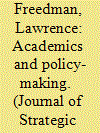

|
|
|
|
|
| Summary/Abstract |
The question of the appropriate relationship between academics and policy-makers is not new and is unlikely ever to be answered to everyone’s satisfaction. There is no rule which says that academic research must be motivated by anything other than innocent curiosity or the state of the discipline, or that policy-makers are under any obligation to take any notice of academic advice given the other demands on their time. Nor is it the case that the academic influence is invariably benign.
|
|
|
|
|
|
|
|
|
|
|
|
|
|
|
|
| 2 |
ID:
151426
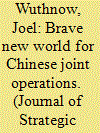

|
|
|
|
|
| Summary/Abstract |
A key organizational challenge for all modern militaries is instituting an effective command-and-control (C2) structure for joint operations. China has been a relative latecomer to joint operations, with a persistent weakness in joint C2. Reforms launched in early 2016 sought to overcome this challenge by establishing a permanent two-level joint C2 structure. Although not a ‘tipping point’ that will lead ineluctably to stronger operational effectiveness, this reform is nonetheless an important milestone in an evolutionary process towards better PLA joint operations. The result could be added operational challenges for several of China’s neighbors and the United States.
|
|
|
|
|
|
|
|
|
|
|
|
|
|
|
|
| 3 |
ID:
151431


|
|
|
|
|
| Summary/Abstract |
The effort to bridge the gap between policymakers and scholars is worthwhile and should continue. But advocates of bridging the gap should recognize that it is likely to have only marginal influence on policy. And they should be mindful of the fact that the entire endeavor, if taken too far, could be detrimental to particular scholars and researchers if it induces them to self-censorship or steers them into intellectual cul-de-sacs.
|
|
|
|
|
|
|
|
|
|
|
|
|
|
|
|
| 4 |
ID:
151432


|
|
|
|
|
| Summary/Abstract |
After finishing my PhD thesis in 2001, I decided to move from academia to government. I wanted to work in a different environment, applying the insights I had gained to the world of practical politics. But while academic research still aroused my curiosity, I quickly realized that it generally reached only a very small and select audience and was not necessarily linked to political and policy realities.
|
|
|
|
|
|
|
|
|
|
|
|
|
|
|
|
| 5 |
ID:
151422
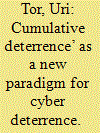

|
|
|
|
|
| Summary/Abstract |
This article suggests that there is a paradigm crisis in the sub-field of cyber deterrence. Cyber deterrence is evolving slowly and unpromisingly as a strategic tool in both theory and practice, mostly due to the ill-fitting theoretical framework and underlining assumptions it borrows from the absolute-nuclear-deterrence context. Therefore, this article suggests replacing the accepted yet inadequate paradigm of absolute deterrence with a better-fitting restrictive-cumulative-deterrence paradigm that draws on the Israeli approach to deterrence, introducing it into the cyber domain. The article further criticizes the current discourse in the field, including some ‘common knowledge’ (mis)understandings of cyberspace and the ways it affects the possibility of deterrence.
|
|
|
|
|
|
|
|
|
|
|
|
|
|
|
|
| 6 |
ID:
151434
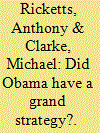

|
|
|
| 7 |
ID:
151421


|
|
|
|
|
| Summary/Abstract |
This article analyzes the political utility of US drone strikes theoretically and deductively. Placing strikes within the context of the theorized political functions of force and considering how they fit into two grand strategies, restraint and selective engagement, I argue that these strikes buy the United States relatively little in the way of political effects assuring its own security because the terrorism threat they are intended to combat is a limited one within the skein of US global interests. Furthermore, their contribution to counter-terrorism efforts is likely to diminish with the adoption of armed drones by non-state actors. Drone strikes can, however, provide leverage over recalcitrant US client states while reassuring liberal partners and giving them some leverage over US choices. In addition, within the counter-terrorism sphere, drone strikes are less likely to inflame popular opinion than are alternative uses of force. This analysis contributes to an increasingly rigorous examination of the strikes’ role in US foreign and security policy.
|
|
|
|
|
|
|
|
|
|
|
|
|
|
|
|
| 8 |
ID:
151425
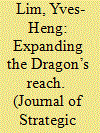

|
|
|
|
|
| Summary/Abstract |
Among the multiple dimensions of the tous azimuths modernisation of Chinese naval forces, the development of China’s anti-access capacity has recently elicited considerable interest. The important link between this capacity and an overarching vision of the use of force – i.e. a naval doctrine – has, however, often been left implicit. This article shows that the particular development of China’s naval anti-access forces – more precisely, forces with an impact on the naval balance – can be explained by a shift of China’s naval doctrine towards a distinctly pre-emptive posture, which, itself, stems from the set of constraints imposed by the framework of ‘local war under informationised conditions’.
|
|
|
|
|
|
|
|
|
|
|
|
|
|
|
|
| 9 |
ID:
151423
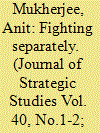

|
|
|
|
|
| Summary/Abstract |
How do countries transition from single service to joint operations? This article engages with the discussion on military innovation to argue that civil–military relations are the most important driver for jointness. In doing so it examines jointness in the Indian military. Relying on archival research and primary interviews this article sheds new light on the operations of the Indian Peacekeeping Forces (IPKF) in Sri Lanka from 1987–1990, the 1999 Kargil War and the Post-Kargil defence reforms. The main argument is that the Indian military’s transition to jointness has been ‘incomplete’ primarily because of its prevailing model of civil-military relations. This model prevents civilians from interfering in the operational issues of the military, including on matters pertaining to jointness. It therefore recommends more forceful civilian intervention to overcome the prevailing single service approach.
|
|
|
|
|
|
|
|
|
|
|
|
|
|
|
|
| 10 |
ID:
151420
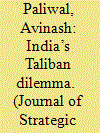

|
|
|
|
|
| Summary/Abstract |
India’s Afghanistan policy in the 1990s is termed a zero-sum game of influence with Pakistan. New Delhi’s aversion to the pro-Pakistan Taliban regime is considered a marker of this rivalry. This paper revisits India’s approach towards Afghanistan and examines if New Delhi was necessarily averse to engaging with pro-Pakistan political factions during 1990s. Based on fresh primary interviews with former Indian policymakers, media archives, and official reports, the paper shows that India engaged with and accommodated pro-Pakistan factions after the Soviet withdrawal in 1989 until 1996. The Taliban’s rise to power in Kabul in September 1996 challenged India’s engage-with-all approach. Nonetheless, the decision to sever ties with the Taliban and to bolster anti-Taliban factions was highly debated in New Delhi. Many in India saw the Taliban as a militant Islamist force sponsored by Pakistan. For others, however, it was an ethno-nationalist movement representing Pashtun interests, and not necessarily under Islamabad’s control.
|
|
|
|
|
|
|
|
|
|
|
|
|
|
|
|
| 11 |
ID:
151424
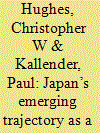

|
|
|
|
|
| Summary/Abstract |
Japan has been overlooked as a ‘cyber power’ but it now becoming a serious player in this new strategic domain. Japanese policy-makers have forged a consensus to move cybersecurity to the very core of national security policy, to create more centralized frameworks for cybersecurity, and for Japan’s military institutions to build dynamic cyberdefense capabilities. Japan’s stance has moved rapidly toward the securitization and now militarization of responses to cyber challenges. Japan’s cybersecurity stance has bolstered US–Japan alliance responses to securing all dimensions of the ‘global commons’ and extended its defense perimeter to further deter but potentially raise tensions with China.
|
|
|
|
|
|
|
|
|
|
|
|
|
|
|
|
| 12 |
ID:
151427
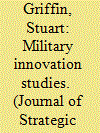

|
|
|
|
|
| Summary/Abstract |
This article explores the evolution of the field of military innovation studies, critiquing its theoretical foundations and setting out a number of challenges that must be overcome if the field is to fulfil its potential and enhance its contribution to wider disciplinary debates as well as to the practitioner community. Tensions between the main theoretical approaches to military innovation are examined as are the challenges inherent in its increasingly multidisciplinary character. The issue of whether military innovation studies constitutes a field in its own right is addressed before recommendations are made to expand the field’s research agenda, broaden its theoretical base and strengthen its multidisciplinary credibility.
|
|
|
|
|
|
|
|
|
|
|
|
|
|
|
|
| 13 |
ID:
151433
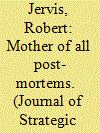

|
|
|
|
|
| Summary/Abstract |
The most striking finding of the Chilcot Report is that the record reveals little that was previously unknown. A key point for its authors is that diplomatic alternatives had not been exhausted when the US and UK went to war. But, short of an armed attack by the other side, it is hard to say when they would have been. Here what was crucial was the belief shared by Bush and Blair that Saddam Hussain would not and could not change. For the British the issue of whether alternatives to war remained is particularly important because of its implications for international law, something that did not trouble the Americans. It remains unclear if Blair would have gained or lost leverage over Bush had he made British participation contingent on better American policy, for example on developing a workable plan for the reconstruction of Iraq.
|
|
|
|
|
|
|
|
|
|
|
|
|
|
|
|
| 14 |
ID:
151430
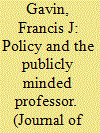

|
|
|
|
|
| Summary/Abstract |
In recent years, there has been a vigorous effort within the disciplines of political science and strategic studies to encourage scholars to become what is termed ‘policy relevant.’ These initiatives have supported an array of activities, including fellowships in government, training in opinion writing and media engagement, and funds to produce research that is perceived to be useful to decision-makers.11 Many of these activities have been generously supported by the Carnegie Corporation of New York. For a partial listing of some of these impressive programs, see Lena Andrews, Rebecca Friedman Lissner, Julia Macdonald, Jacquelyn Schneider and Rachel Whitlark, 6 May 2015, ‘Getting Involved in Policy: An Overworked Grad Student’s Guide,’ War on the Rocks, 28 Oct. 2016,
|
|
|
|
|
|
|
|
|
|
|
|
|
|
|
|
| 15 |
ID:
151428


|
|
|
|
|
| Summary/Abstract |
The concept of the command of the sea has its roots in medieval notions of the sovereignty of coastal waters, as claimed by several monarchs and polities of Europe. In the sixteenth century, a surge of intellectual creativity, especially in Elizabethan England, fused this notion with the Thucydidean term ‘thalassocracy’ – the rule of the sea. In the light of the explorations of the oceans, this led to a new conceptualisation of naval warfare, developed in theory and then put into practice. This falsifies the mistaken but widespread assumption that there was no significant writing on naval strategy before the nineteenth century.
|
|
|
|
|
|
|
|
|
|
|
|
|
|
|
|
|
|
|
|
|